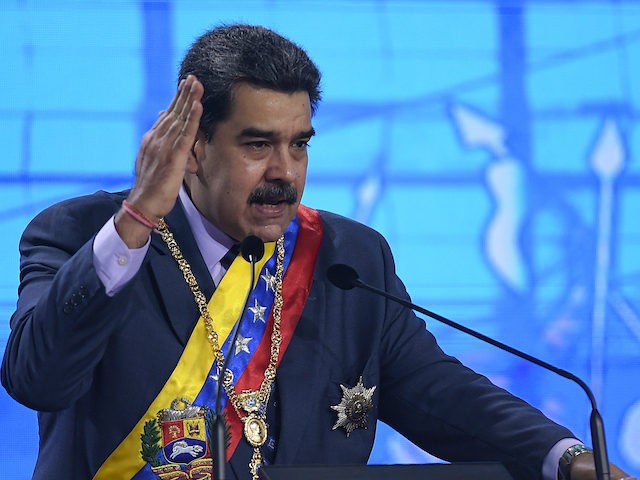CARACAS — A group of 18 “Progressive” Democrat members of Congress sent a letter to President Joe Biden this week urging him to drop sanctions against the authoritarian socialist regime of Nicolás Maduro in Venezuela.
The letter, spearheaded by Raúl M. Grijalva (D-AZ) and Jesús “Chuy” García (D-IL), is co-signed by Reps. Alexandria Ocasio-Cortez (D-NY), Ilhan Oman (D-MN), Rashida Tlaib (D-MI), Ayanna Pressley (D-MA), and Pramilia Jayapal (D-WA), among others. The letter urges the Biden administration to continue pursuing dialogue with the Maduro regime and to end the sanctions imposed upon it.
The sanctions the Trump administration placed on the Maduro regime came long after the inevitable socialist-driven collapse of the country. They did not precede Venezuela’s ongoing economic and political crisis and cannot retroactively be the cause of the suffering of the Venezuelan people, especially during 2014-2018, when the food shortages and rationing were so intense that ID-based locks and fingerprint scanners were put in place to ration food.
Venezuela’s ongoing severe health crisis has left citizens without access to proper healthcare, be it public or private.
The Democrats’ letter bases its reasoning on quotes offered by the widely reviled, failed perennial presidential candidate and “opposition” leader Henrique Capriles Radonski in a radio interview in March. Capriles, who the Maduro regime banned from running for any office for 15 years in 2017, is one of the more prominent “opposition” figureheads that have called for the end of sanctions against Maduro.
In April, a group of Venezuelan “opposition” figureheads sent a similar letter to the Biden administration calling for the end of sanctions against the Maduro regime.
A recently published poll showed that nearly 80 percent of Venezuela’s population believes that the opposition are sellouts and are doing nothing to stop Maduro’s socialist regime.
Contrary to Capriles and the Democrats, Héctor Rodríguez, president of the Venezuelan-American Chamber of Commerce and Industry (VenAmCham), recently said that the United States sanctions have not affected the Venezuelan private sector. According to VenAmCham, Venezuelan private exports to the United States grew 80 percent in 2021.
Beyond listening to Capriles, the Democrats appear to be adopting talking points from Maduro himself. The dictator has blamed all of Venezuela’s woes on an alleged “economic war” waged by the United States against his regime. One of the most fundamental pillars of the narrative of Venezuela’s United Socialist Party (PSUV) is to place the blame for everything on U.S. sanctions, including the sanctions imposed by the Obama administration against key members of the regime.
In March 2022, the Biden administration sent a delegation to Venezuela to discuss a possible oil deal with Maduro. The move was so universally disliked that the Biden administration backpedaled on the idea. The continued unpopular leftist antics of the Democrats have caused Hispanic support to shift towards the Republican Party. A recent Wall Street Journal poll showed that Republicans now have a nine-point national lead among Hispanic voters.
On a citizen level, life in Venezuela continues as-is, aside from certain noticeable improvements in the availability of products. Anyone in Venezuela who dares to express support for sanctions against the Maduro regime can be prosecuted for treason. If you make a joke on social media that ends up offending the regime’s authorities, you will be prosecuted for “hate speech” and forced to record a public apology.
Free media in Venezuela is non-existent, with most private media outlets self-censoring in favor of their continued survival. Those that do not comply are sued into oblivion by skewed trials and their infrastructure seized by socialist party members. The Venezuelan regime, which has a near-monopoly on Venezuela’s internet access, continues to block access to foreign and independent media outlets and forces private internet service providers to comply with the censorship lest they lose their operating licenses.
Due to the lack of any political solution offered by the opposition, Venezuelans have realistically two choices: stay and survive for as long as they can, or flee and face uncertainty and growing xenophobia against Venezuelans in the region. The Venezuelan migrant crisis that has so far seen more than 6 million people flee from socialism, has only been temporarily slowed down by the remaining Chinese coronavirus travel restrictions and by ever-increasing visa impositions on Venezuelan citizens and local bureaucracy conundrums that prevent them from obtaining proper migrant documentation in a timely manner.
With an “opposition” and a group of Democrats essentially doing sanctions lobby work for him, Nicolás Maduro has availed himself of the opportunity to try to delay the International Criminal Court’s probe on the crimes against humanity committed by his regime while also attempting to recover the Venezuelan economy that his regime destroyed, and to try to rehabilitate his image both locally and internationally — going as far as to selectively adapting tidbits of Western “woke” language on his social media posts to entice millennial leftists in the U.S. and portraying a “relatable” image through his personal account on the Chinese Tik Tok platform.
Alberto Fernández, the president of Argentina, is among the leftist leaders in the region that have begun to aid Maduro in his campaign to sanitize his image. Fernandez has said he intends to re-establish diplomatic ties with the Maduro regime after his predecessor, Mauricio Macri, broke relationships with Venezuela 2019. Gustavo Petro, leftist candidate in the upcoming Colombian presidential elections, has said that if he wins his country will re-establish diplomatic ties with Maduro.
The Biden administration still considers the Maduro regime as illegitimate “marked by authoritarianism, intolerance for dissent, and violent and systematic repression of human rights, and fundamental freedoms – including the use of torture, arbitrary detentions, extrajudicial killings, and the holding of more than 300 prisoners of conscience.”
Secretary of State Antony J. Blinken continues to make calls that both the opposition and the socialist regime resume their negotiations.
Christian K. Caruzo is a Venezuelan writer and documents life under socialism. You can follow him on Twitter here.

COMMENTS
Please let us know if you're having issues with commenting.